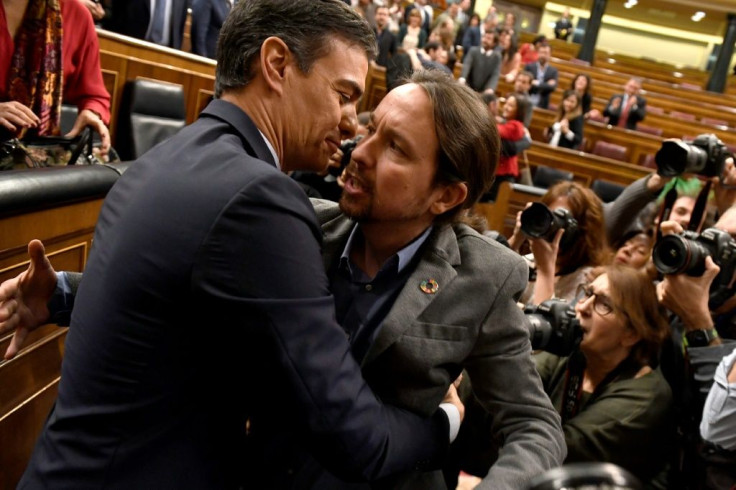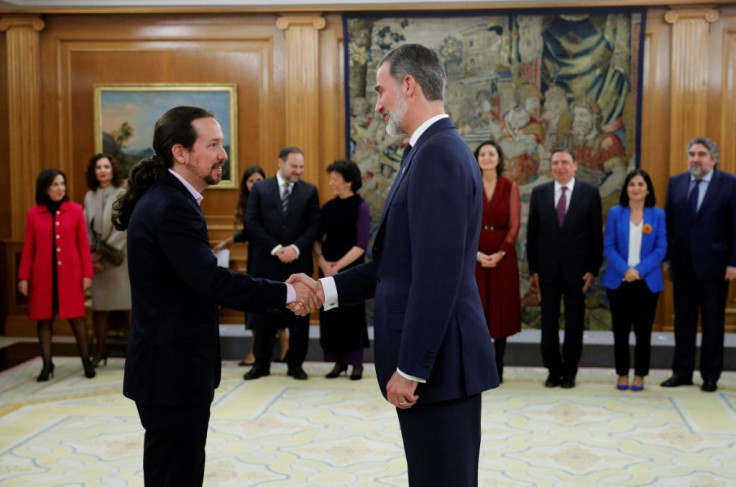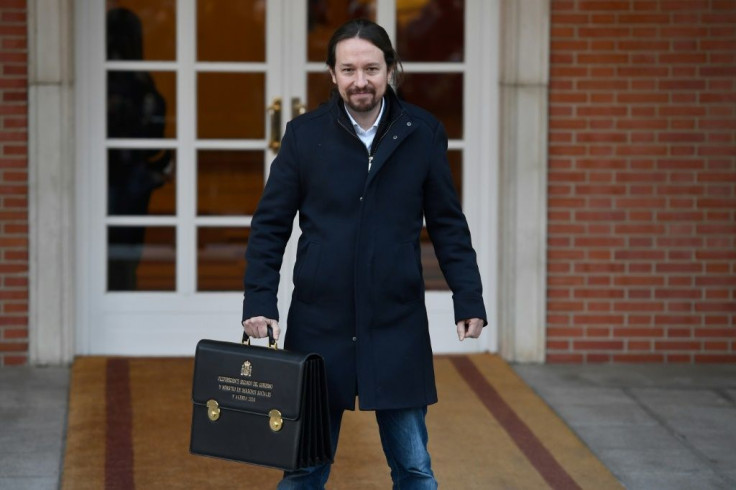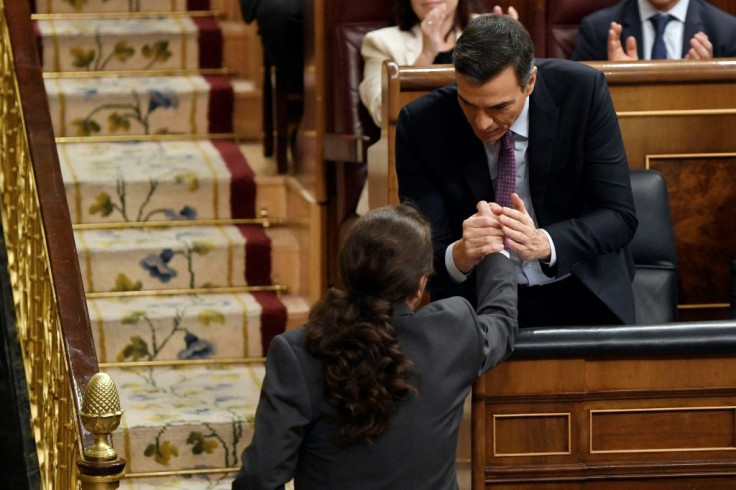From Grassroots To Government: Spain's Podemos Comes Of Age

Spain's radical leftwing Podemos took its seat at the cabinet table for the first time on Tuesday, nearly a decade after the emergence of the anti-austerity protest movement from which it emerged.
Following almost a year of political deadlock, Prime Minister Pedro Sanchez's new coalition government was holding its first meeting on Tuesday, a day after being sworn in.
The ruling alliance, Spain's first coalition government since the 1930s, brings together Sanchez's Socialists and Podemos, whose leader Pablo Iglesias, a pony-tailed former professor of political science, takes up his position as one of four deputy prime ministers.
Iglesias, who holds the social rights portfolio, is one of five hard-left ministers in the new government, all drawn from Podemos and its political allies.
In the spring of 2011, as Spain was gripped by a severe economic crisis, hundreds of thousands of young demonstrators gathered in Puerta del Sol in central Madrid and in cities across the country to protest at the government's drastic anti-austerity measures.
Among the protesters, who stayed there for weeks, was a group of university professors, one of them Iglesias who in January 2014 set up Podemos, whose name means: "We Can."

The group initially adopted a fighting stance against cronyism and corruption, advocating a redistribution of wealth and an end to the monarchy.
But it has mellowed over the years, while remaining to the left of Sanchez's Socialists.
"Podemos was kind of a utopia that was needed," recalled supporter Nacho Pelaez, sitting at a bar in Lavapies, a rapidly gentrifying neighbourhood of Madrid that is the party's stronghold.
Several months later, Podemos secured around eight percent of the vote in the European Parliament election of May 2014, earning it five seats.

The party's 35-year-old leader and newly elected MEP pledged to work for an end to the policies of "austerity and financial totalitarianism" being enforced across Europe.
Within a year, Podemos had managed to seize control of town halls in Madrid and Barcelona and galvanised by the victory of its hard-left Syriza allies in Greece, it went on to become Spain's third-largest party following elections in December 2015 and June 2016.
Its unconventional lawmakers -- who did not bat an eyelid about turning up to parliament in jeans and dreadlocks -- alongside fellow upstarts from liberal Ciudadanos, managed to disrupt the traditional two-party dominance of the Socialists and the conservative Popular Party (PP).
But despite its advances, Podemos never managed to achieve its stated objective of outgunning the Socialists, instead finding itself weakened by internal disputes.

Iglesias saw off his number three, Sergio Pascual, and also quarrelled with his friend and deputy Inigo Errejon, who ended up leaving and forming his own party.
And he was also hit by a controversy that erupted after he and his partner Irene Montero -- also a fellow minister in the new government -- purchased a luxury villa in 2018.
In 2016, the party refused to back a proposed coalition between the Socialists and Ciudadanos, but two years later threw its weight behind Sanchez, enabling him to topple PP premier Mariano Rajoy.
But since then, the relationship between the two parties has been uneasy, souring rapidly last summer as they engaged in ultimately fruitless coalition talks.
In September, as Sanchez said yet another election was necessary -- the fourth in as many years -- he defended his decision not to form a coalition with Podemos arguing that their lack of experience would have kept him awake at night.
But both the Socialists and Podemos emerged weaker from the November vote, which propelled the far-right Vox party into third place, forcing Sanchez and Iglesias to ink the very deal that had eluded them for months -- in the space of just a few days.
And this week they take office offering a programme with a marked social agenda.
Podemos "needs to be in government to stop haemorrhaging votes, to put down electoral roots and to try and rebuild the party", said Jos? Ignacio Torreblanca of the European Council on Foreign Relations think tank.
But its entry into government has divided those supporters who have been there since the start.
"It's disappointing," Ramon Alonso told AFP at a bar in Lavapies, pointing to the politicisation of a party that emerged from a grassroots protest movement.
"The basis for the whole project has been lost."
But fellow activist Nacho Pelaez, seated several tables away, prefers to see the glass as half full.
"I understand many people will criticise" Podemos for its alliance with the Socialists, he said.
"But I think it's the only real solution that we have now."
© Copyright AFP 2024. All rights reserved.





















